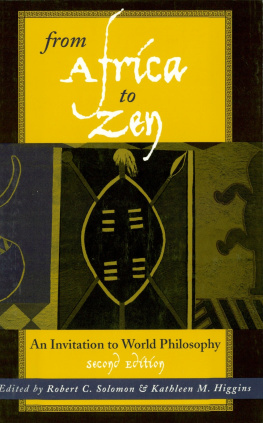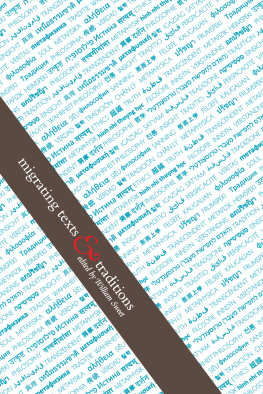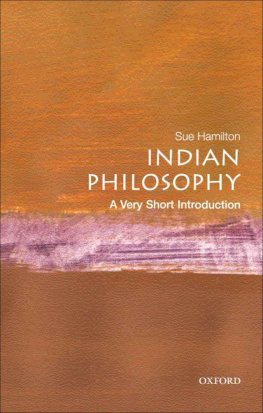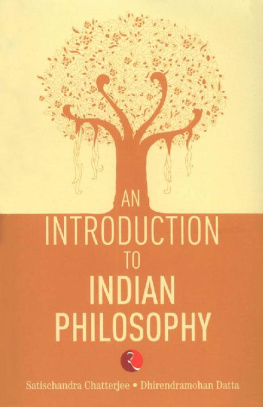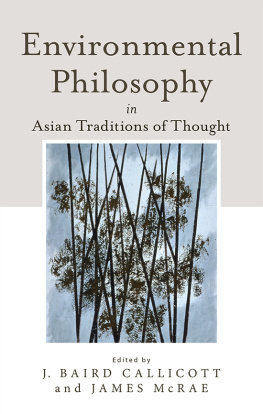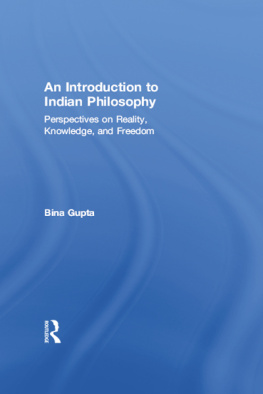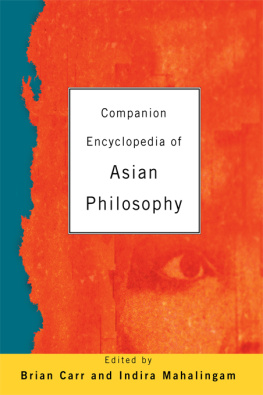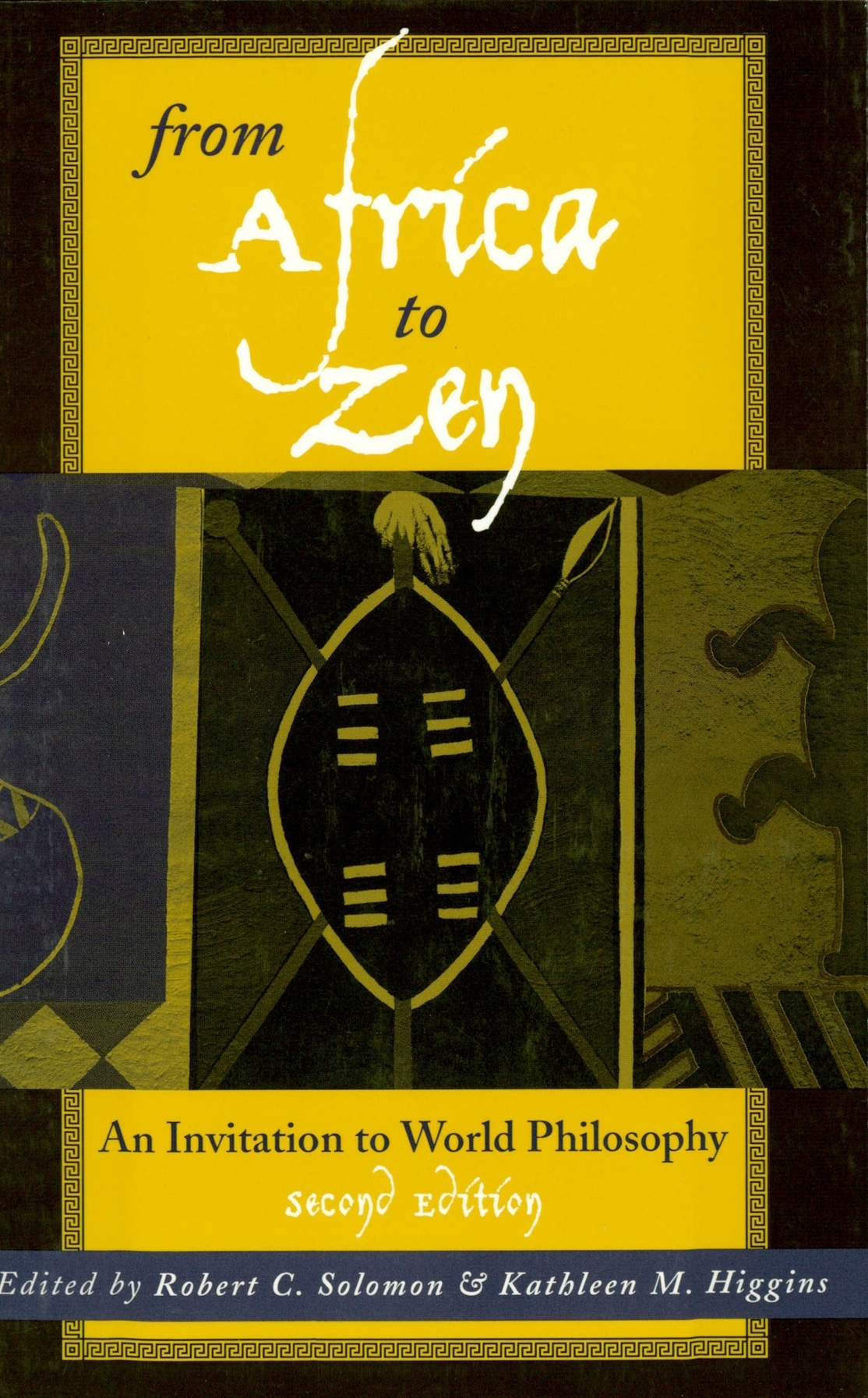About the Contributors
Roger T. Ames is professor of philosophy at the University of Hawaii in Honolulu, the editor of Philosophy East and West and the author of Thinking Through Confucius, Anticipating China, Thinking from the Han, and many other books on Chinese thought and philosophy. He is a translator of Confucius, Lao-Tzu (Laozi), and Sun-Tzu.
J. Baird Callicott is professor of philosophy at North Texas State University and the author of Earths Insights: A Survey of Ecological Ethics from the Mediterranean Basin to the Australian Outback and coauthor (with Thomas W. Overholt) of Clothed-in-Fur and Other Tales, and editor of The Great New Wilderness Debate.
David L. Hall was professor of philosophy at the University of Texas at El Paso and the coauthor (with Roger T. Ames) of Thinking Through Confucius, Anticipating China, Thinking from the Han, and many other books on Chinese thought and philosophy.
Peter D. Hershock is director of programs at the EastWest Center at the University of Hawaii in Honolulu and the author of Liberating Intimacy: Enlightenment and Social Virtuosity in Chan Buddhism and Reinventing the Wheel: A Buddhist Response to the Information Age.
Kathleen M. Higgins is professor of philosophy at the University of Texas at Austin and the author of Nietzsches Zarathustra, The Music of Our Times, A Short History of Philosophy (with Robert C. Solomon), and Comic Relief.
Oliver N. Leaman is professor of religion at the University of Kentucky at Lexington and the author of Evil and Suffering in Jewish Philosophy and the editor of History of Jewish Philosophy (with D. Frank).
Janet McCracken is professor at Lake Forest College in Illinois and the author of Taste and the Household: The Domestic Aesthetic and Moral Reasoning and Thinking about Gender.
Robert A. McDermott is professor at the California Institute of Integral Studies in San Francisco and the author of The Essential Aurobindo and The Essential Steiner.
Eric Ormsby is director of the Institute of Islamic Studies and director of the Mc-Clennen Library at McGill University in Montreal and the author of many books on Arabic and Islamic philosophy, including Theodicy in Islamic Thought, Facsimiles of Time, and For a Modest God (poems).
Thomas W. Overholt is professor of philosophy at the University of Wisconsin at Stevens Point and the coauthor (with J. Baird Callicott) of Clothed-in-Fur and Other Tales.
Graham Parkes is professor of philosophy at the University of Hawaii in Honolulu and the author of Nietzsche and the Asian Tradition.
Roy W. Perrett is professor of philosophy at the University of Hawaii in Honolulu and the author of Hindu Ethics: A Philosophical Study, Death and Immortality, and coeditor (with Graham Oddie) of Justice, Ethics, and New Zealand Society.
Stephen H. Phillips is professor of philosophy at the University of Texas at Austin and the author of Aurobindos Philosophy of Brahman, Classical Indian Metaphysics: Refutations of Realism and the Emergence of New Logic, and Philosophy of Religion: A Global Approach.
Robert C. Solomon is the Quincy Lee Centennial Professor of Philosophy at the University of Texas at Austin and the author of many books and textbooks in philosophy, including From Rationalism to Existentialism, The Passions, The Joy of Philosophy, and Spirituality for the Skeptic.
Homayoon Sepasi teaches at Saint Johns College in Santa Fe, New Mexico.
Jacqueline Trimier teaches philosophy and the humanities at the College of Lake County in Grayslake, Illinois.
Jorge Valadez is professor of philosophy at Our Lady of the Lake University in San Antonio and the author of Deliberative Democracy, Political Legitimacy, and Self-Determination in Multicultural Societies.
Understanding Order: The Chinese Perspective
David L. Hall and Roger T. Ames
Late in the evening of June 4, 1989, government tanks rolled into Beijings Tiananmen Square, the symbolic center of China, to clear the square of protesters. Snapshot: Scorching lights advancing across the square reduce everything to outline as a tent is caught and half-flattened beneath the treads of a tank steamrolling its straight line across the square. Snapshot: A terrified young soldier with rifle still hot and smoking is being dragged from a jeep by faceless arms into the maw of a frenzied crowd. Snapshot: Three students stand atop a tour bus that has been detained and searched, and as proof that its civilian occupants are Peoples Liberation Army (PLA) soldiers, the students hold up an automatic weapon and two helmets for the crowd to see. Snapshot: The plaster Goddess of Democracy lies broken in several pieces. A heavy armored vehicle has pulled it from its wooden stand, and it has toppled through the many institutional flags that still fly around its base. Snapshot: A student turns back with contorted face as he sees the young woman in a pink dress running beside him reel and fall face forward onto the pavement. Snapshot: The stiff, charred body of a PLA soldier, naked except for his hat and shoes, is kept upright against the shell of a burned-out bus by taut wire wrapped around his neck; He killed four people is written with masking tape on the bus beside him.
Unfortunately, we have become increasingly familiar with scenes such as these over the past generation. The news media have provided vivid accounts of events apparently similar to the Tiananmen incident: protesters with placards and loudspeakers exhorting liberal reforms and proclaiming certain victory for their cause; soldiers, in helmets and khaki uniforms, firing upon their fellow citizens.
Were we to look at Tiananmen through Chinese eyes, however, would we really see an event explicable in the terms used to explain student protests in our own country or, for that matter, the broader acts of governmental violence in the Middle East, South Africa, or Eastern Europe?
Instinctively, we believe that pain and the brutality that causes it are the same around the globe. But much of what we are coming to understand about China and its people tells us that there is an otherness about the Chinese sensibility which defies immediate understanding in either the terms of our common sense or the terms of the abstract categories and principles associated with the sort of intellectual analysis philosophers are apt to attempt.
For example, how are we to interpret the incident at Tiananmen as a democratic revolt if in our democracy there is a prevailing conception of personhood that entails natural rights, free choice, independence, autonomy, and so on, while in China such values, far from being self-evident and normative, have traditionally been regarded by even the sagest Chinese as sociopathic?
Of course the rhetoric of a democratic society such as ours must insist that the dictum all men are created equal applies to all human beings and that, therefore, the Chinese are fundamentally the same as us, differing only in such incidentals as their use of chopsticks, the shape of their eyes, and so forth. Such rhetoric was responsible for the blithe, clichd interpretation assumed by much of the American news coverage of Tiananmen: An unpopular and tyrannical government crushes young George Washingtons.
Yet this belief in a common humanity is belied by the xenophobic stereotypes that have become part of our understanding of things Chinese. The most familiar associations of the word Chinese in our popular discourse are puzzling, confusing, absurd. There are many examples of this sort of understanding. A perplexing puzzle that is found to have no solution is called a Chinese puzzle. When someone does mischief to himself to spite another, he has taken a Chinese revenge. A Chinese flush in poker has only the same color to recommend it. Chinese screwdriver is Australian slang for a hammer. A Chinese fire drill is a college prank in which, while stopped at a traffic signal, students leap from an automobile, run around in circles, and reenter the car just as the light changes. Finally, to end this rather ignoble litany, there is a familiar expression: Someone or something has a Chinamans chancethat is, practically no chance at all.

